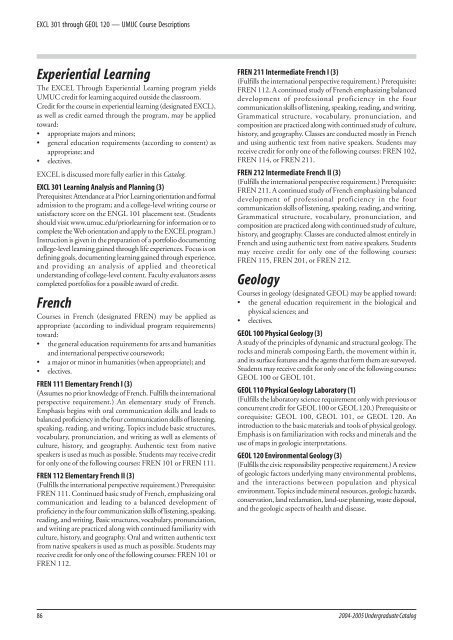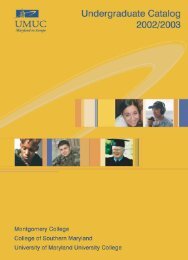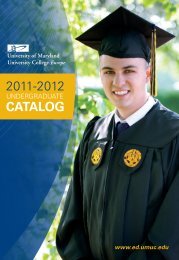Statements of Policy - UMUC Europe
Statements of Policy - UMUC Europe
Statements of Policy - UMUC Europe
You also want an ePaper? Increase the reach of your titles
YUMPU automatically turns print PDFs into web optimized ePapers that Google loves.
EXCL 301 through GEOL 120 — <strong>UMUC</strong> Course Descriptions<br />
Experiential Learning<br />
The EXCEL Through Experiential Learning program yields<br />
<strong>UMUC</strong> credit for learning acquired outside the classroom.<br />
Credit for the course in experiential learning (designated EXCL),<br />
as well as credit earned through the program, may be applied<br />
toward:<br />
• appropriate majors and minors;<br />
• general education requirements (according to content) as<br />
appropriate; and<br />
• electives.<br />
EXCEL is discussed more fully earlier in this Catalog.<br />
EXCL 301 Learning Analysis and Planning (3)<br />
Prerequisites: Attendance at a Prior Learning orientation and formal<br />
admission to the program; and a college-level writing course or<br />
satisfactory score on the ENGL 101 placement test. (Students<br />
should visit www.umuc.edu/priorlearning for information or to<br />
complete the Web orientation and apply to the EXCEL program.)<br />
Instruction is given in the preparation <strong>of</strong> a portfolio documenting<br />
college-level learning gained through life experiences. Focus is on<br />
defining goals, documenting learning gained through experience,<br />
and providing an analysis <strong>of</strong> applied and theoretical<br />
understanding <strong>of</strong> college-level content. Faculty evaluators assess<br />
completed portfolios for a possible award <strong>of</strong> credit.<br />
French<br />
Courses in French (designated FREN) may be applied as<br />
appropriate (according to individual program requirements)<br />
toward:<br />
• the general education requirements for arts and humanities<br />
and international perspective coursework;<br />
• a major or minor in humanities (when appropriate); and<br />
• electives.<br />
FREN 111 Elementary French I (3)<br />
(Assumes no prior knowledge <strong>of</strong> French. Fulfills the international<br />
perspective requirement.) An elementary study <strong>of</strong> French.<br />
Emphasis begins with oral communication skills and leads to<br />
balanced pr<strong>of</strong>iciency in the four communication skills <strong>of</strong> listening,<br />
speaking, reading, and writing. Topics include basic structures,<br />
vocabulary, pronunciation, and writing as well as elements <strong>of</strong><br />
culture, history, and geography. Authentic text from native<br />
speakers is used as much as possible. Students may receive credit<br />
for only one <strong>of</strong> the following courses: FREN 101 or FREN 111.<br />
FREN 112 Elementary French II (3)<br />
(Fulfills the international perspective requirement.) Prerequisite:<br />
FREN 111. Continued basic study <strong>of</strong> French, emphasizing oral<br />
communication and leading to a balanced development <strong>of</strong><br />
pr<strong>of</strong>iciency in the four communication skills <strong>of</strong> listening, speaking,<br />
reading, and writing. Basic structures, vocabulary, pronunciation,<br />
and writing are practiced along with continued familiarity with<br />
culture, history, and geography. Oral and written authentic text<br />
from native speakers is used as much as possible. Students may<br />
receive credit for only one <strong>of</strong> the following courses: FREN 101 or<br />
FREN 112.<br />
86<br />
FREN 211 Intermediate French I (3)<br />
(Fulfills the international perspective requirement.) Prerequisite:<br />
FREN 112. A continued study <strong>of</strong> French emphasizing balanced<br />
development <strong>of</strong> pr<strong>of</strong>essional pr<strong>of</strong>iciency in the four<br />
communication skills <strong>of</strong> listening, speaking, reading, and writing.<br />
Grammatical structure, vocabulary, pronunciation, and<br />
composition are practiced along with continued study <strong>of</strong> culture,<br />
history, and geography. Classes are conducted mostly in French<br />
and using authentic text from native speakers. Students may<br />
receive credit for only one <strong>of</strong> the following courses: FREN 102,<br />
FREN 114, or FREN 211.<br />
FREN 212 Intermediate French II (3)<br />
(Fulfills the international perspective requirement.) Prerequisite:<br />
FREN 211. A continued study <strong>of</strong> French emphasizing balanced<br />
development <strong>of</strong> pr<strong>of</strong>essional pr<strong>of</strong>iciency in the four<br />
communication skills <strong>of</strong> listening, speaking, reading, and writing.<br />
Grammatical structure, vocabulary, pronunciation, and<br />
composition are practiced along with continued study <strong>of</strong> culture,<br />
history, and geography. Classes are conducted almost entirely in<br />
French and using authentic text from native speakers. Students<br />
may receive credit for only one <strong>of</strong> the following courses:<br />
FREN 115, FREN 201, or FREN 212.<br />
Geology<br />
Courses in geology (designated GEOL) may be applied toward:<br />
• the general education requirement in the biological and<br />
physical sciences; and<br />
• electives.<br />
GEOL 100 Physical Geology (3)<br />
A study <strong>of</strong> the principles <strong>of</strong> dynamic and structural geology. The<br />
rocks and minerals composing Earth, the movement within it,<br />
and its surface features and the agents that form them are surveyed.<br />
Students may receive credit for only one <strong>of</strong> the following courses:<br />
GEOL 100 or GEOL 101.<br />
GEOL 110 Physical Geology Laboratory (1)<br />
(Fulfills the laboratory science requirement only with previous or<br />
concurrent credit for GEOL 100 or GEOL 120.) Prerequisite or<br />
corequisite: GEOL 100, GEOL 101, or GEOL 120. An<br />
introduction to the basic materials and tools <strong>of</strong> physical geology.<br />
Emphasis is on familiarization with rocks and minerals and the<br />
use <strong>of</strong> maps in geologic interpretations.<br />
GEOL 120 Environmental Geology (3)<br />
(Fulfills the civic responsibility perspective requirement.) A review<br />
<strong>of</strong> geologic factors underlying many environmental problems,<br />
and the interactions between population and physical<br />
environment. Topics include mineral resources, geologic hazards,<br />
conservation, land reclamation, land-use planning, waste disposal,<br />
and the geologic aspects <strong>of</strong> health and disease.<br />
2004-2005 Undergraduate Catalog






